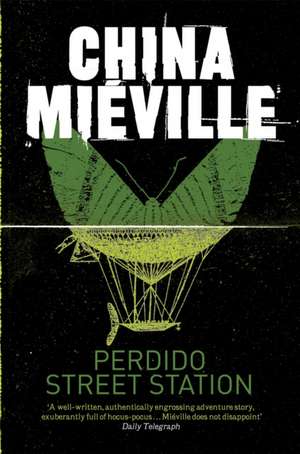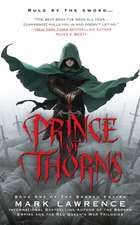Perdido Street Station
Autor China Mievilleen Limba Engleză Paperback – 6 mai 2011
Winner of the August Derleth award, Perdido Street Station is an imaginative fantasy thriller, and the first of China Mieville's novels set in the world of Bas-Lag. The metropolis of New Crobuzon sprawls at the centre of its own bewildering world. Humans and mutants and arcane races throng the gloom beneath its chimneys, where the rivers are sluggish with unnatural effluent, and factories and foundries pound into the night.
For more than a thousand years, the parliament and its brutal militia have ruled over a vast array of workers and artists, spies, magicians, junkies and whores. Now a stranger has come, with a pocketful of gold and an impossible demand, and inadvertently something unthinkable is released. Soon the city is gripped by an alien terror - and the fate of millions depends on a clutch of outcasts on the run from lawmakers and crime-lords alike.
The urban nightscape becomes a hunting ground as battles rage in the shadows of bizarre buildings. And a reckoning is due at the city's heart, in the vast edifice of Perdido Street Station. It is too late to escape.
| Toate formatele și edițiile | Preț | Express |
|---|---|---|
| Paperback (2) | 54.92 lei 3-5 săpt. | +56.05 lei 6-12 zile |
| Pan Macmillan – 6 mai 2011 | 54.92 lei 3-5 săpt. | +56.05 lei 6-12 zile |
| Del Rey Books – 31 ian 2001 | 131.57 lei 3-5 săpt. |
Preț: 54.92 lei
Preț vechi: 86.15 lei
-36% Nou
10.51€ • 10.97$ • 8.70£
Carte disponibilă
Livrare economică 14-28 martie
Livrare express 27 februarie-05 martie pentru 66.04 lei
Specificații
ISBN-10: 0330534238
Pagini: 866
Dimensiuni: 197 x 129 x 54 mm
Greutate: 0.6 kg
Editura: Pan Macmillan
Colecția Pan Books
Recenzii de la cititorii Books Express
ARLA BORCHIN-TORNOREANU a dat nota:
It's like Neil Gaiman had a baby with Neil Gaiman and that baby grew up and had another baby with Neil Gaiman and then that baby grew up and wrote this book.
Notă biografică
Extras
A window burst open high above the market. A basket flew from it and arced
towards the oblivious crowd. It spasmed in mid-air, then spun and
continued earthwards at a slower, uneven pace. Dancing precariously as it
descended, its wire-mesh caught and skittered on the building’s rough
hide. It scrabbled at the wall, sending paint and concrete dust plummeting
before it.
The sun shone through uneven cloud-cover with a bright grey light. Below
the basket the stalls and barrows lay like untidy spillage. The city
reeked. But today was market day down in Aspic Hole, and the pungent slick
of dung-smell and rot that rolled over New Crobuzon was, in these streets,
for these hours, improved with paprika and fresh tomato, hot oil and fish
and cinnamon, cured meat, banana and onion.
The food stalls stretched the noisy length of Shadrach Street. Books and
manuscripts and pictures filled up Selchit Pass, an avenue of desultory
banyans and crumbling concrete a little way to the east. There were
earthenware products spilling down the road to Barrackham in the south;
engine parts to the west; toys down one side street; clothes between two
more; and countless other goods filling all the alleys. The rows of
merchandise converged crookedly on Aspic Hole like spokes on a broken
wheel.
In the Hole itself all distinctions broke down. In the shadow
of old walls and unsafe towers were a pile of gears, a ramshackle
table of broken crockery and crude clay ornaments, a case of mouldering
textbooks. Antiques, sex, flea-powder. Between the stalls stomped hissing
constructs. Beggars argued in the bowels of deserted buildings. Members of
strange races bought peculiar things. Aspic Bazaar, a blaring mess of
goods, grease and tallymen. Mercantile law ruled: let the buyer beware.
The costermonger below the descending basket looked up into flat sunlight
and a shower of brick particles. He wiped his eye. He plucked the frayed
thing from the air above his head, pulling at the cord which bore it until
it went slack in his hand. Inside the basket was a brass shekel and a note
in careful, ornamented italics. The food-vendor scratched his nose as he
scanned the paper. He rummaged in the piles of produce before him, placed
eggs and fruit and root vegetables into the container, checking against
the list. He stopped and read one item again, then smiled lasciviously and
cut a slice of pork. When he was done he put the shekel in his pocket and
felt for change, hesitating as he calculated his delivery cost, eventually
depositing four stivers in with the food.
He wiped his hands against his trousers and thought for a minute, then
scribbled something on the list with a stub of charcoal and tossed it
after the coins.
He tugged three times at the rope and the basket began a bobbing journey
into the air. It rose above the lower roofs of surrounding buildings,
buoyed upwards by noise. It startled the roosting jackdaws in the deserted
storey and inscribed the wall with another scrawled trail among many,
before it disappeared again into the window from which it had emerged.
Isaac Dan der Grimnebulin had just realized that he was dreaming. He had
been aghast to find himself employed once again at the university,
parading in front of a huge blackboard covered in vague representations of
levers and forces and stress. Introductory Material Science. Isaac had
been staring anxiously at the class when that unctuous bastard Vermishank
had looked in.
“I can’t teach this class,” whispered Isaac loudly. “The market’s too
loud.” He gestured at the window.
“It’s all right.” Vermishank was soothing and loathsome. “It’s time for
breakfast,” he said. “That’ll take your mind off the noise.” And hearing
that absurdity Isaac shed sleep with immense relief. The raucous profanity
of the bazaar and the smell of cooking came with him into the day.
He lay hugely in the bed without opening his eyes. He heard Lin walk
across the room and felt the slight listing of the floorboards. The garret
was filled with pungent smoke. Isaac salivated.
Lin clapped twice. She knew when Isaac woke. Probably because he closed
his mouth, he thought, and sniggered without opening his eyes.
“Still sleeping, shush, poor little Isaac ever so tired,” he whimpered,
and snuggled down like a child. Lin clapped again, once, derisory, and
walked away.
He groaned and rolled over.
“Termagant!” he moaned after her. “Shrew! Harridan! All right, all right,
you win, you, you . . . uh . . . virago, you spit-fire . . .” He rubbed
his head and sat up, grinned sheepishly. Lin made an obscene gesture at
him without turning around.
She stood with her back to him, nude at the stove, dancing back as hot
drops of oil leapt from the pan. The covers slipped from the slope of
Isaac’s belly. He was a dirigible, huge and taut and strong. Grey hair
burst from him abundantly.
Lin was hairless. Her muscles were tight under her red skin, each
distinct. She was like an anatomical atlas. Isaac studied her in cheerful
lust.
His arse itched. He scratched under the blanket, rooting as shameless as a
dog. Something burst under his nail, and he withdrew his hand to examine
it. A tiny half-crushed grub waved helplessly on the end of his finger. It
was a refflick, a harmless little khepri parasite. The thing must have
been rather bewildered by my juices, Isaac thought, and flicked his finger
clean.
“Refflick, Lin,” he said. “Bath time.”
Lin stamped in irritation.
New Crobuzon was a huge plague pit, a morbific city. Parasites, infection
and rumour were uncontainable. A monthly chymical dip was a necessary
prophylactic for the khepri, if they wanted to avoid itches and sores.
Lin slid the contents of the pan onto a plate and set it down, across from
her own breakfast. She sat and gestured for Isaac to join her. He rose
from the bed and stumbled across the room. He eased himself onto the small
chair, wary of splinters.
Isaac and Lin sat naked on either side of the bare wooden table. Isaac was
conscious of their pose, seeing them as a third person might. It would
make a beautiful, strange print, he thought. An attic room, dust-motes in
the light from the small window, books and paper and paints neatly stacked
by cheap wooden furniture. A dark-skinned man, big and nude and
detumescing, gripping a knife and fork, unnaturally still, sitting
opposite a khepri, her slight woman’s body in shadow, her chitinous head
in silhouette.
They ignored their food and stared at each other for a moment. Lin signed
at him: Good morning, lover. Then she began to eat, still looking at him.
It was when she ate that Lin was most alien, and their shared meals were a
challenge and an affirmation. As he watched her, Isaac felt the familiar
trill of emotion: disgust immediately stamped out, pride at the stamping
out, guilty desire.
Light glinted in Lin’s compound eyes. Her headlegs quivered. She picked up
half a tomato and gripped it with her mandibles. She lowered her hands
while her inner mouthparts picked at the food her outer jaw held steady.
Isaac watched the huge iridescent scarab that was his lover’s head devour
her breakfast.
He watched her swallow, saw her throat bob where the pale insectile
underbelly segued smoothly into her human neck . . . not that she would
have accepted that description. Humans have khepri bodies, legs, hands;
and the heads of shaved gibbons, she had once told him.
He smiled and dangled his fried pork in front of him, curled his tongue
around it, wiped his greasy fingers on the table. He smiled at her. She
undulated her headlegs at him and signed, My monster.
I am a pervert, thought Isaac, and so is she.
Breakfast conversation was generally one-sided: Lin could sign with her
hands while she ate, but Isaac’s attempts to talk and eat simultaneously
made for incomprehensible noises and food debris on the table. Instead
they read; Lin an artists’ newsletter, Isaac whatever came to hand. He
reached out between mouthfuls and grabbed books and papers, and found
himself reading Lin’s shopping list. The item a handful of pork slices was
ringed and underneath her exquisite calligraphy was a scrawled question in
much cruder script: Got company??? Nice bit of pork goes down a treat!!!
Isaac waved the paper at Lin. “What’s this filthy arse on about?” he
yelled, spraying food. His outrage was amused but genuine.
Lin read it and shrugged.
Knows I don’t eat meat. Knows I’ve got a guest for breakfast. Wordplay on
“pork.”
“Yes, thanks, lover, I got that bit. How does he know you’re a vegetarian?
Do you two often engage in this witty banter?”
Lin stared at him for a moment without responding.
Knows because I don’t buy meat. She shook her head at the stupid question.
Don’t worry: only ever banter on paper. Doesn’t know I’m bug.
Her deliberate use of the slur annoyed Isaac.
“Dammit, I wasn’t insinuating anything . . .” Lin’s hand waggled, the
equivalent of a raised eyebrow. Isaac howled in irritation. “Godshit, Lin!
Not everything I say is about fear of discovery!”
Isaac and Lin had been lovers nearly two years. They had always tried not
to think too hard about the rules of their relationship, but the longer
they were together the more this strategy
of avoidance became impossible. Questions as yet unasked demanded
attention. Innocent remarks and askance looks from others, a moment of
contact too long in public—a note from a grocer—everything was a reminder
that they were, in some contexts, living a secret. Everything was made
fraught.
They had never said, We are lovers, so they had never had to say, We will
not disclose our relationship to all, we will hide from some. But it had
been clear for months and months that this was the case.
Lin had begun to hint, with snide and acid remarks, that Isaac’s refusal
to declare himself her lover was at best cowardly, at worst bigoted. This
insensitivity annoyed him. He had, after all, made the nature of his
relationship clear with his close friends, as Lin had with hers. And it
was all far, far easier for her.
She was an artist. Her circle were the libertines, the patrons and the
hangers-on, bohemians and parasites, poets and pamphleteers and
fashionable junkies. They delighted in the scandalous and the outré. In
the tea-houses and bars of Salacus Fields, Lin’s escapades—broadly hinted
at, never denied, never made explicit—would be the subject of louche
discussion and innuendo. Her love-life was an avant-garde transgression,
an art-happening, like Concrete Music had been last season, or ’Snot Art!
the year before that.
And yes, Isaac could play that game. He was known in that world, from long
before his days with Lin. He was, after all, the
scientist-outcast, the disreputable thinker who walked out of a lucrative
teaching post to engage in experiments too outrageous and brilliant for
the tiny minds who ran the university. What did he care for convention? He
would sleep with whomever and whatever he liked, surely!
That was his persona in Salacus Fields, where his relationship with Lin
was an open secret, where he enjoyed being more or less open, where he
would put his arm around her in the bars and whisper to her as she sucked
sugar-coffee from a sponge. That was his story, and it was at least half
true.
He had walked out of the university ten years ago. But only because he
realized to his misery that he was a terrible teacher.
He had looked out at the quizzical faces, listened to the frantic
scrawling of the panicking students, and realized that with a mind that
ran and tripped and hurled itself down the corridors of theory in anarchic
fashion, he could learn himself, in haphazard lurches, but he could not
impart the understanding he so loved. He had hung his head in shame and
fled.
In another twist to the myth, his Head of Department, the ageless and
loathsome Vermishank, was not a plodding epigone but an exceptional
bio-thaumaturge, who had nixed Isaac’s research less because it was
unorthodox than because it was going nowhere. Isaac could be brilliant,
but he was undisciplined. Vermishank had played him like a fish, making
him beg for work as a freelance researcher on terrible pay, but with
limited access to the university laboratories.
And it was this, his work, which kept Isaac circumspect about his lover.
Recenzii
--BRIAN STABLEFORD
"China Miéville's cool style has conjured up a triumphantly macabre technoslip metropolis with a unique atmosphere of horror and fascination."
--PETER HAMILTON
"It is the best steampunk novel since Gibson and Sterling's."
--JOHN CLUTE


























